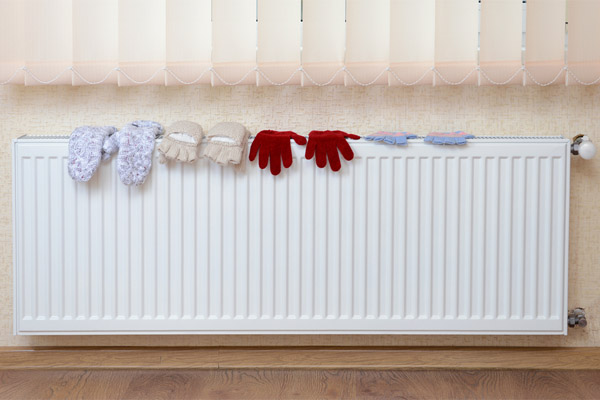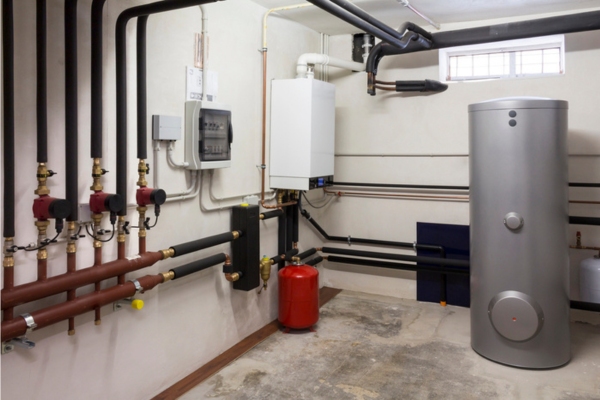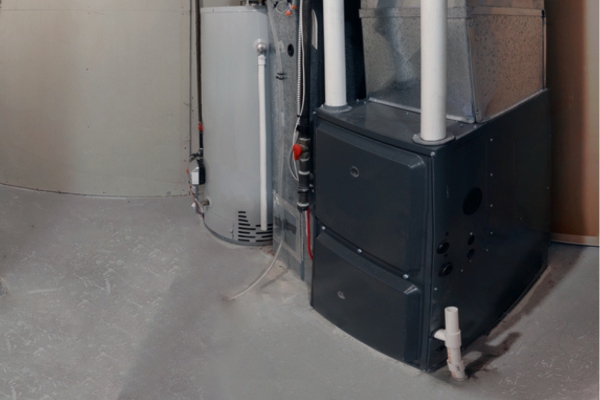Boiler Vs. Furnace: Choosing The Best Heating Option

When it comes to home heating, many people are unsure about the difference between a boiler vs. furnace. The confusion is understandable since both systems are designed to heat your home. However, the way each one operates and distributes warmth is quite different, and these differences can significantly impact comfort and efficiency.
At Hart Home Comfort, we help homeowners make informed decisions about their heating systems. Whether you’re upgrading or starting from scratch, knowing how a boiler compares to a furnace is key. In this article, we’ll break down the features, advantages, and considerations of each to help you find the right solution for your home.
Winter Comfort Begins with Hart Home Comfort: Make sure your home stays heated and comfortable all season long. Reach out today!
Boiler Heating vs. Forced-Air Furnace Systems: Key Differences
Table of Contents
- 1 Boiler Heating vs. Forced-Air Furnace Systems: Key Differences
- 2 Boiler Systems: Advantages and Drawbacks
- 3 Furnace Heating: Benefits and Limitations
- 4 Common Questions About Boiler vs Furnace
- 4.1 How Frequently Should My Furnace or Boiler Be Serviced?
- 4.2 What Are the Warning Signs My Boiler Needs Repairs?
- 4.3 Is It Possible to Improve the Efficiency of My Current Furnace or Boiler?
- 4.4 What Factors Should I Weigh When Selecting a New Furnace or Boiler?
- 4.5 Are There Safety Risks Associated with Furnaces and Boilers?
- 5 Conclusion
- 6 Reach Out to Hart Home Comfort for All Your HVAC Needs

This article explores some important distinctions between boilers and forced-air furnaces.
Stay Warm This Winter: Prepare your home for the cold with expert heating solutions. Call Hart Home Comfort now to schedule your service.
Understanding What Defines a Boiler

A boiler is a sealed unit designed to heat water or another liquid to produce steam or vapor. It plays a central role in many home heating systems, serving as both the heat source and the mechanism responsible for distributing warmth throughout the space.
Hydronic heating, also referred to as a radiator system, uses water or liquid to deliver warmth throughout a home. In addition to the boiler, this system includes components such as baseboards, radiators, piping, and a circulator pump. These parts are placed in various rooms to ensure even heat distribution. The number of components in a residential boiler setup often depends on how many rooms need to be heated.
Trust Hart Home Comfort for All Your Heating Needs: Whether you need a new installation or reliable repairs, Hart Home Comfort is here to keep your heating system running at its best. Contact us today!
Understanding What a Furnace Is
A furnace is a type of heating system that warms your home by heating air. Often referred to as a “forced-air heating system,” it pulls in cool or room-temperature air, moves it through a heat exchanger, and then distributes the warmed air through a network of HVAC ducts. Furnaces come in three main configurations: horizontal, upflow, and downflow. They can operate using oil, electricity, natural gas, or induction, depending on the model and fuel source.
How Do Boilers and Furnaces Differ?
The main difference between a boiler and a furnace is how each system delivers heat. A boiler heats water in a tank and sends the hot water or steam through a network of pipes throughout the home. These heated pipes warm the surrounding areas, allowing rooms to rise in temperature gradually. As long as the boiler keeps generating hot water or steam, it will continue to heat the space efficiently.
In contrast, a furnace heating system uses a heat exchanger to warm air instead of liquid. Once the air is heated, a blower motor moves it through the home’s ductwork and vents to maintain a comfortable indoor temperature. This forced-air method provides quick and widespread heat distribution.
Winter-Proof Your Home with Hart Home Comfort: Get expert heating support to keep your space warm and inviting all season. Call Hart Home Comfort today for trusted service.
Boiler vs Furnace: Which Offers Better Energy Efficiency?
Heating air typically requires more energy than heating water, which means furnaces tend to use fuel more quickly than boilers. While boilers generally come with a higher upfront cost, they may offer longer service life when properly maintained. Overall, the energy efficiency and long-term value of either system often depend on regular upkeep and how well the unit is cared for.
Boiler Systems: Advantages and Drawbacks

Here are some of the key benefits and limitations of using a boiler for home heating:
Advantages
- Energy Efficiency: Boilers typically require less fuel to generate heat, helping lower your overall energy costs.
- Quiet Operation: Since boilers don’t rely on moving air through vents, they operate with less noise than forced-air systems.
- Even Heating: The use of hot water or steam delivers steady, consistent warmth throughout the home.
- Improved Air Quality: Boilers don’t circulate air, so they don’t spread dust, allergens, or other airborne particles like furnaces can.
Disadvantages
- Heating Only: Boilers provide heat but cannot be used for cooling. Unlike furnaces, their systems are not compatible with central air conditioning setups.
- Complex Installation: Installing a boiler system usually takes longer and involves more labor than a furnace.
- Slower Response Time: Boilers are slower to react to thermostat changes, so temperature adjustments may take longer to feel.
- Leak Risks: Older or worn boilers can be prone to water or fluid leaks, which may cause damage if left unaddressed.
- Challenging to Convert: Switching from a boiler to a furnace system is costly and complicated, especially since ductwork must be installed from scratch.
Boost Your Home’s Heating with Hart Home Comfort: Discover how Hart Home Comfort can help you improve efficiency and reduce energy costs. Call today to explore our innovative heating solutions!
Furnace Heating: Benefits and Limitations

Here are some of the key advantages and disadvantages of using a furnace for home heating:
Advantages
- Versatile Fuel Options: Furnaces can operate on electricity, natural gas, heating oil, or propane. Some less common models even use solar or geothermal energy.
- Quick Heating: Furnaces can raise indoor temperatures faster than boilers, providing rapid comfort during colder weather.
- Affordable Options: With various models available, furnaces are often more competitively priced due to their widespread use.
- Low Risk of Damage from Leaks: If a furnace develops a leak, it typically involves air rather than water, which reduces the risk of structural damage.
- No Freezing Concerns: Furnaces don’t rely on water, so there’s no risk of burst pipes during extreme winter cold, which is an issue that can affect boiler systems.
Disadvantages
- Noise During Operation: Furnace blowers create a noticeable sound as they push air through the ductwork. The system tends to make noise each time it starts up.
- Uneven Heating: Warm air doesn’t circulate as evenly as hot water or steam, which can result in temperature differences from room to room.
- Air Quality Concerns: Without regular filter replacements, furnaces can circulate dust and allergens, lowering the indoor air quality over time.
Warm Up with Help from Hart Home Comfort: Let Hart Home Comfort provide the heating support you need to stay comfortable all season. Call us now for reliable service.
Common Questions About Boiler vs Furnace

How Frequently Should My Furnace or Boiler Be Serviced?
To keep your system running efficiently, it’s best to schedule professional service once a year, preferably before the heating season starts. Routine maintenance improves performance, helps extend the system’s service life, and reduces the risk of sudden malfunctions during cold weather.
What Are the Warning Signs My Boiler Needs Repairs?
If your boiler starts making odd sounds such as banging, whistling, or gurgling, it may be time for a repair. Other red flags include visible water around the unit, a noticeable drop in heating performance, or fluctuating hot water temperatures.
Is It Possible to Improve the Efficiency of My Current Furnace or Boiler?
Yes, you can boost the efficiency of your existing heating system by maintaining it regularly, improving your home’s insulation, sealing any gaps in the ductwork or piping, and using a programmable thermostat to manage temperatures more effectively.
Maximize Efficiency with Hart Home Comfort: Take control of your energy use with expert heating services from Hart Home Comfort. Call now to explore our efficient heating options.
What Factors Should I Weigh When Selecting a New Furnace or Boiler?
When choosing a new heating system, think about the type of fuel it uses, the unit’s energy efficiency, such as high AFUE ratings for furnaces or strong thermal efficiency ratings for boilers, and whether the system is appropriately sized for your home. You should also check for available rebates or incentives that apply to energy-efficient models to help reduce upfront costs.
Are There Safety Risks Associated with Furnaces and Boilers?
Yes, safety is essential when it comes to heating systems. Always have your furnace or boiler installed by a licensed professional and schedule regular inspections. Carbon monoxide is a serious concern, so it’s essential to place carbon monoxide detectors near the units. Additionally, make sure all safety valves and emergency shut-off controls are in proper working order to help prevent potential hazards.
Conclusion
Deciding whether to install a furnace or a boiler comes down to your specific heating needs and your home’s current setup. If you’re upgrading an older system, today’s models offer high-efficiency performance, which can lead to long-term energy savings. Still unsure which option is right for you? Contact a trusted HVAC professional for expert guidance tailored to your home and comfort goals.
Keep the Cold Out with Hart Home Comfort: Rely on Hart Home Comfort for dependable, energy-efficient heating solutions designed to keep your home cozy all winter. Contact us today!
Reach Out to Hart Home Comfort for All Your HVAC Needs
Hart Home Comfort proudly delivers top-quality heating and cooling services in Nassau County, Suffolk County, and Queens, New York. Our team comprises certified, highly trained technicians specializing in HVAC tune-ups, repairs, installations, and full system replacements. Each technician brings the expertise needed to keep your HVAC system running efficiently and reliably.
We offer some of the most competitive pricing in the region for HVAC services. Our routine service options enhance indoor comfort, boost energy efficiency, and help lower utility bills. If you’re considering a new system, we’ll guide you to the ideal solution for your home and budget. All of our work is backed by a satisfaction guarantee.
Contact Hart Home Comfort today to schedule your service visit. We provide free in-home consultations. Call now!
For any questions about what Hart Home Comfort can do for you, give us a call today. Click here to contact us now or call us at (631) 667-3200 to find out more! Click the link to view our service area.

Related Articles: